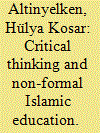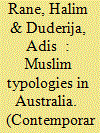|
|
|
Sort Order |
|
|
|
Items / Page
|
|
|
|
|
|
|
| Srl | Item |
| 1 |
ID:
181152


|
|
|
|
|
| Summary/Abstract |
This article offers an analysis of conversion to Islam in Russia through the lens of the problem of contemporary relations between converts and the country’s indigenous Muslim communities. Following the theoretical schemas of Lofland and Skonovd, Wolhrab-Sahr and Allievi, the article traces the key reasons for choosing Islam among the Russian population, the role of ethnic Muslims in this process as well as the general portrayals of the latter in online conversion narratives. In this regard, the study aims to contribute to the discussion about the prevalence of latent “Muslim Islamophobia” among Russian converts and their claims to cultural and religious superiority over Russia’s born Muslims as well as labour migrants from Central Asia. In particular, this article demonstrates that various forms of interaction between Russians and ethnic Muslims, involving the formation of close interpersonal bonds and deep fascination with ethnic Muslims’ personal values, religiosity and cultural traditions, may be viewed as the predominant factor that drives conversion to Islam in Russia. I also argue that while some converts in the sample do suggest the existence of some specific forms of Islam linked to the Russian cultural ethos, others strongly reject this position, downplay their ethnic identity or advocate the supra-national universality of Islam.
|
|
|
|
|
|
|
|
|
|
|
|
|
|
|
|
| 2 |
ID:
181146


|
|
|
|
|
| Summary/Abstract |
This article analyzes the socio-cultural impact of failure by Muslims in Kenya to review British colonial statutes that disrupted traditional awqãf (religious endowments) practices in the postcolonial period. Awqãf are autonomous enterprise meant for spiritual expression of taqwa (piety), seeking qurba (closeness) with God, and to ensure socio-economic security of the endower’s progeny and social welfare in the community. Upon establishment of the British colonial rule (1895–1963), however, a wide range of legal codes, that remain enforced in the postcolonial period, were instituted effectively impacting on the local Islamic notion on awqãf, resource control, and social welfare. As Muslims negotiated the legal statutes from the colonial to postcolonial era, nonetheless, it became manifest that the struggles revolved around not only control of awqãf and fulfillment of spiritual obligations but also appropriation of the principle of shurut al-waqif (conditions of endower) to safeguard sectarian interests that compromised Muslim cultural unity and identity.
|
|
|
|
|
|
|
|
|
|
|
|
|
|
|
|
| 3 |
ID:
181149


|
|
|
| 4 |
ID:
181147


|
|
|
|
|
| Summary/Abstract |
Critical thinking is a highly valued skill in the twenty-first century, and its incorporation into formal school curricula as a core skill is nearly ubiquitous globally. It is considered imperative for educational quality, employability, competitiveness, and for promoting democratisation and social integration. While schools are tasked to promote critical thinking, non-formal Islamic education (NFIE) provided by mosques or by private organisations or tutors is often criticized for its emphasis on rote learning and memorisation, and for fostering an uncritical acceptance of authority. Based on interviews with 27 young adult alumni from four different Muslim communities in the Netherlands, this study seeks to explore the pedagogy of NFIE, with a focus on critical thinking. The accounts of young adults revealed that an emphasis on stimulating critical thinking was largely absent, and there were limited opportunities for interactions, questions, debating or challenging the authority of religious educators or Islamic texts. The traditional pedagogical approach, discouraging attitudes of educators and peers, lack of language proficiency, the young age of learners, and a perceived lack of need for critical deliberations were identified as key challenges. Young adults called for reforming the pedagogy of NFIE to allow for more reflexive, inquisitive and dialogical learning. Some argued that lack of critical deliberation would lead to weakness in the belief structures and faith of new generation Muslims in Europe, resulting in a sense of confusion and disorientation, and limited embodiment of Islamic principles.
|
|
|
|
|
|
|
|
|
|
|
|
|
|
|
|
| 5 |
ID:
181151


|
|
|
|
|
| Summary/Abstract |
Contemporary scholars in the intersecting field of popular culture and Islamic studies have argued for the importance of researching the ways Muslims engage with, make meaning of, and (re)produce different forms of popular culture. The current study continues these endeavours by examining a hitherto understudied form of popular culture in this field, namely, Korean popular culture. As previous studies on Islam and popular culture have drawn attention to, the focus of this study is on how this specific form of popular culture has been in/compatible with Islamic values, beliefs, and practices. Taking Indonesia as a context, the current study asked: What are the various ways Indonesian Muslim fans negotiate their identities as a Muslim and a K-pop fan? Drawing upon interview data with Indonesian Muslim K-pop fans and publicly available literature such as media reports, news, and websites, the findings exhibited at least four subject positions (available to be) taken up by Muslim K-pop fans, namely, (1) complete opposition, (2) partial opposition, (3) irrelevance, and (4) the interlacing of religious and fan subjectivity. The first two positions are predicated upon a belief that Islam and K-pop culture are in tensions, while the latter two consider there is no tension between one’s identity as a Muslim and a K-pop fan. This article contributes to the existing knowledge in the field of Islam and popular culture by offering a nuanced discussion on various possible forms of Muslim K-pop fans’ subjectivity.
|
|
|
|
|
|
|
|
|
|
|
|
|
|
|
|
| 6 |
ID:
181150


|
|
|
|
|
| Summary/Abstract |
Numerous researchers in the field of Islamic and Muslim Studies have proposed various typologies to categorize Muslims in relation to their understanding of and identification with Islam. However, to date few studies have conducted the necessary empirical work to determine the numbers of Muslims that identify with the typologies that have been constructed. This article is the first to present findings based on a comprehensive study of Muslims in relation to a spectrum of discursive typologies. The authors conducted a national survey of Islam in Australia among Muslim citizens and permanent residents in 2019. This article examines Muslim Australians across a spectrum of 10 typologies in relation to various demographic factors, questions concerning shariah and political Islam, sources of influence, preferences for interpreting the Qur’an, views on various ethical, social, and theological issues, engagement with non-Muslims, and openness to new knowledge about Islam. Contrary to stereotypical views of Islam and Muslims, the article’s findings point to a strong presence for liberal and progressive typologies and interpretations of the Islamic tradition among Muslim Australians.
|
|
|
|
|
|
|
|
|
|
|
|
|
|
|
|
| 7 |
ID:
181148


|
|
|
|
|
| Summary/Abstract |
This article examines how the intersections of Singaporean Malay-Muslim women’s religious and gendered subjectivities influence their lifestyle habits and health attitudes. It explores the gaps between their practices, perspectives and discourses that discuss Islam’s relevance in health educational programmes. Individual semi-structured interviews with 19 local women of diverse social backgrounds show that while Islam is influential in their health conceptions, this is limited to the self-internalisation of theologically-based discourses. Discussions on how positive gender relations based on Islamic values can contribute to women’s health outcomes are lacking in their narratives, existing academic literature and public discourses. A comprehensive approach to leveraging religious concepts in advocating good health for Muslims should also include women’s empowerment and improvement of gender relations.
|
|
|
|
|
|
|
|
|
|
|
|
|
|
|
|
|
|
|
|
|